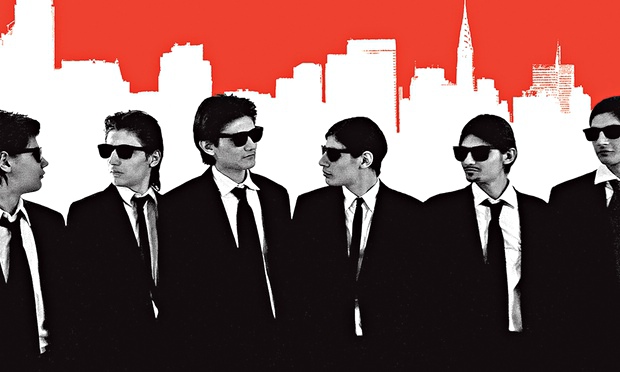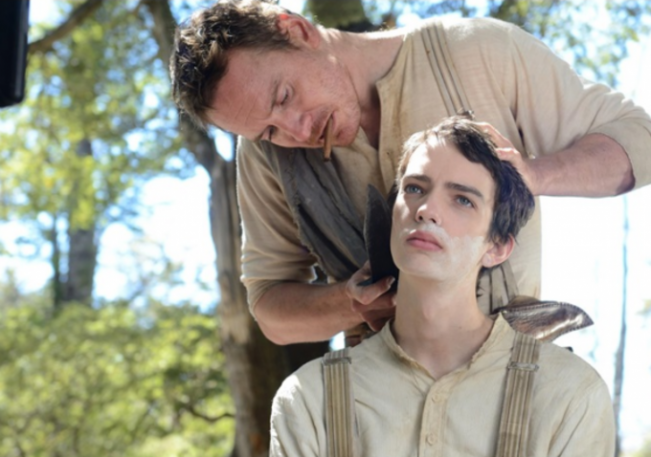By Jake Howell jake.howell@utoronto.ca
Sundance Reviews: The Wolfpack, Slow West
Unique ironies surround Crystal Moselle’s bewildering documentary The Wolfpack, not the least of which is that the film opens with a group of brothers at home reenacting Reservoir Dogs, a film that premiered at Sundance 23 years ago. Last night, the very same brothers stood in front of the screen and interacted with the audience for a Q&A, dressed just like Misters Blonde, Blue, Brown, Orange, Pink, and White. I was stunned.

Tarantino’s 1992 masterpiece is just one of the many films that have captivated and inspired the Angulo brothers – six of them, to be exact, with one very shy sister – who have, for the majority of their life, been essentially locked away in their Lower East Side Manhattan apartment. Their interactions with the world have been extremely limited (“I just learned Google was a word,” one brother says) and what they know about society has primarily been from their apartment window and their television screen, the portal that expands their world and lets them watch any of their 5,000+ movie catalogue (I hope they publish their list of top films ever made, a document we only hear the highlights of – JFK is their top film ever).
Because moving images have been one of their only forms of entertainment, these boys are the ultimate cinephiles. They love movies to the point I feel put to shame by, and for fun they take their love of cinema to another level, writing scripts down by hand (and typewriter), quoting lines and key scenes, and re-enacting films like The Dark Knight, Pulp Fiction, and The Godfather, complete with impressively homemade props and costumes (one Batman outfit is made from yoga mats and cereal boxes). This aspect of The Wolfpack is highly entertaining, and keeps the surreality of the situation from becoming overbearing.
So how bizarre is it that these boys are now the subject of a compelling documentary? It’s a trip, to be sure. They have always loved both sides of the camera, taping and documenting their lives inside their apartment, clips of which Moselle splices into her film. It’s these real documents of a growing yet repressed family that underlines the staggering reality that this family has never really left home, and things are not okay as a result. Fortunately, the very charming Angulo brothers open up to Moselle, talking about their father (a troubled man; we learn little about him) and mother (who has clearly been through a lot as a result of her husband); there is immense catharsis here.
When one brother reveals the story behind his first escape, Moselle captures a wistful connection as her subject looks into the camera. It’s here the film transitions into how the Angulo brothers plan to leave the nest and get jobs (their father has been anti-work for many years). While it’s great to see the liberation of men tasting freedom for the first time, most bizarre is the sadness as these brothers begin to move apart: they’ve spent their entire lives in close proximity, and while we all have stories about families naturally separating into their own units, there’s really nothing we can do to relate or compare with how these brothers must feel growing into adulthood.
This movie is one-of-a-kind. If Boyhood was a young boy growing over the length of one movie, The Wolfpack shows young boys growing through movies; the result is a mix that is a sort of real-life Be Kind Rewind and Dogtooth combined (though that film is far more narratively negative than this; this movie is ultimately positive). From how they think of strangers to what they know about the world, this movie is an ethnographic look at a mixed-race family that is clearly very talented and has a lot to offer the world. It’s odd to write about this family, and it’s even odder to watch watch as they learn to adjust to the real world, complete with awkward interactions as they take their first steps around New York City as free men (watch the delight on their faces as they see a film in a real cinema, dressed to the nines as they do so). That said I can do little else but recommend this film post-haste; it is an absolutely fascinating documentary and one of the strongest reminders of the indomitable power of film I have seen.
SLOW WEST
Maybe it never really went away, but it seems as if the Western genre has had a bit of a renaissance in recent cinema. From straight dust-ups by Tarantino to more neo-Western revenge flicks like, say, Blue Ruin and then the genre entries from countries that aren’t American (when will kickass Danish Oater The Salvation be released stateside?), it’s a good time these days to love a dusty trail and riding off into the sunset.

Slow West falls in that latter category, a UK-New Zealand co-production that, like Lord of the Rings, uses the beautiful – yet craggy and harsh – panoramic exteriors of New Zealand as a substitute for the American Old West, including plains, mountain passes, and lush forests. The film follows teenaged Jay (Kodi Smit-McPhee), a Romeo travelling from Scotland to reunite with his Juliet (Rose, played by Caren Pistorius) hiding somewhere in the American West. But strong-and-silent Silas – a roaming bounty hunter played by Michael Fassbender – realizes there is a large price on Rose’s head, and he offers to escort the naive greenhorn Jay across the dangerous terrain with a hidden agenda.
This is a gorgeously-shot movie which is really great, because as the title implies, prepare to saddle up for a slow burn start to shoot-out pay-off finish. Backed by the talents of ace cinematographer Robbie Ryan, writer-director John Maclean takes his time with the narrative, patiently building a body-count while exhibiting his cinematic reverence to the natural world. In terms of photography, the West here is almost a character; it has many treacherous geographies and exerts indiscriminate acts of God upon its inhabitants, who are not without sin. As one minor character suggests, if he only broke bread with those who had never committed murder, he would be “a very lonely man indeed.”
From the corpse of a lumberjack killed by his own felled tree to a raging flood that nearly carries Jay and Silas away, death – both by the natural world and by unnatural lead – is a major theme here, reinforcing the Old West as an unforgiving time and place to live (albeit a great setting for a movie). Second to death is the dramatic irony that Maclean wisely mines for humour; one poignant scene provides new context to the expression “salt in the wound,” and it’s brilliant writing winks like these which work on many levels to highlight the futility of 19th-century roguery and unrequited romance.
This is another standout film at Sundance 2015. In addition to its very capable performances and engaging script, Slow West is the resounding rifle-crack welcome to an exciting and meticulous newcomer John Maclean. His staging of the bloody finale alone will turn studio heads, and it would please this Western fan very much to see his excellent blocking seen in this film’s climactic siege blown up and supported on future, bigger – and perhaps faster – projects.
















It kinda reads like you’re saying that New Zealand served as a stand-in for the American Old West in the Lord of the Rings movies.
Enjoyed the review though, film sounds great. Always on the lookout for a good Western.